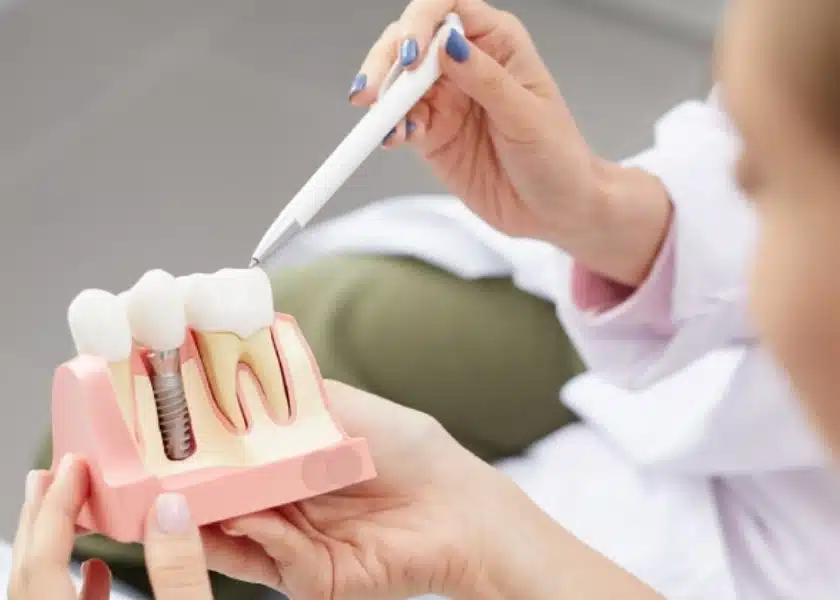Many individuals facing dental implant surgery often wonder: does insurance cover dental implant surgery? This question looms large as they navigate the complexities of dental insurance policies and the costs associated with implant procedures. Dental implants, while highly effective and beneficial for oral health, can also be financially daunting without adequate insurance coverage.
According to the American Academy of Implant Dentistry, there are 3 million people in the U.S. with dental implants, and this number is increasing by 500,000 each year. A study on dental implant trends suggests that by 2026, nearly 6% to 23% of Americans could have dental implants.
Let us explore more about dental insurance and examine how much coverage it provides for dental implant surgery. These details will help individuals make informed choices regarding their dental health and financial stability.
Understanding Dental Insurance Coverage
Many insurance companies consider dental implants as purely cosmetic and may not consider them medically necessary, resulting in non-coverage. However, individuals missing teeth understand the importance of replacing them for their overall health and well-being.
Securing coverage for your dental implant procedure might involve utilizing both medical and dental insurance, depending on the underlying reasons for treatment. It’s advisable to carefully review your insurance policy to ascertain whether dental implants are included in the coverage provided when you initially enrolled in the policy. Before commencing treatment, it’s crucial to inquire with your insurance company to avoid any surprises:

- Does your plan extend coverage for implants?
- What percentage of the implant procedure does the policy cover?
- What is the maximum annual out-of-pocket cost I might incur?
- Is a referral necessary prior to receiving dental implants?
Your dentist’s office staff can collaborate directly with your insurance company to assess your coverage based on the proposed treatment plan.
Is Implant Coverage Included In My Insurance?
Does insurance cover dental implant surgery? It’s essential to grasp the various aspects of the treatment and the extent of mouth preparation required for the implant. The coverage amount also depends on whether you’re undergoing a full restorative arch procedure or simply replacing one or two missing teeth.
Tooth Extraction: The necessity for this procedure depends on whether you’re already missing teeth or if a damaged tooth requires extraction before replacement. If the damaged tooth remains, this extraction procedure is typically part of your dental implant treatment and is usually covered, either fully or partially, by most insurance companies.
Bone Grafting: Some patients may require reinforcement of their underlying jawbone before the implant procedure to ensure stability. Despite its critical role, insurance coverage for bone grafting may not be guaranteed.
Implant Placement: The implant placement process is categorized as a “major” dental procedure. Despite the term “major,” which primarily reflects cost rather than treatment intensity, some dental insurance plans cover up to 50% of major procedures.
Artificial Tooth Placement: The artificial tooth, known as a crown in dental terms, is vital for both appearance and functionality. Although considered a major procedure, some insurance plans may categorize it similarly to crowning to halt tooth decay and may cover a higher portion of the cost. It’s advisable to verify coverage details directly with your insurance company.

Does medical insurance cover dental implants?
It’s rare for health insurance to cover dental implants. However, an exception may apply if a severe injury, like one resulting from a car accident, leads to mouth damage. In such cases, health insurance might cover dental implants deemed “medically necessary.”
Medicare plans might also cover dental implants deemed medically necessary. Nonetheless, finding a dentist who performs implants and accepts health insurance or Medicare plans for dental procedures can be challenging.
Can Dental Implants be Paid for with FSA or HSA Funds?
A flexible spending account (FSA) or a health savings account (HSA) are tax-advantaged savings options that you might use to cover the expenses of your dental implant procedure. However, it’s essential to understand the guidelines regarding dental implants.
FSAs
If your employer offers an FSA, you can use the funds to cover various out-of-pocket healthcare expenses, including dental treatments.
Keep in mind that you might need to furnish a receipt for your implant along with a doctor-signed letter of medical necessity.
HSAs
With an HSA, you can use the account funds to pay for dental procedures such as dental implants—provided the implant isn’t solely for cosmetic purposes. A medical diagnosis may be necessary.
An HSA resembles an FSA but can be obtained through your employer or independently if you purchase your insurance. Additionally, you must have a high-deductible health plan to contribute to an HSA
How much do dental implants cost without dental insurance?
In the United States, the average cost to replace a single tooth typically ranges between $3,000 and $4,500. For a complete set of teeth, the cost can escalate to between $20,000 and $45,000.
Interested in learning more about your options for dental implant surgery coverage? Get in touch with Diamond Dental in Bellingham, WA, today to arrange your appointment. For new patients, please call (360) 516-4610, while all other callers can reach us at (360) 734-1999. Take the first step toward improving your dental health, and schedule your consultation now!
FAQs
Many individuals inquire about insurance coverage for dental implant surgery due to its importance for oral health. However, coverage varies among insurance providers and policies. It’s advisable to review your insurance policy and inquire directly with your provider about coverage details.
Insurance coverage for dental implants can vary based on factors such as the necessity of tooth extraction, bone grafting, implant placement, and artificial tooth placement. Understanding your insurance coverage for each aspect of treatment is crucial for informed decision-making.
Dental implant insurance policies contribute to a portion of the procedure’s cost. However, the percentage covered varies significantly from one policy to another. Certain policies cover only 50% of the expense, while others may cover up to 70%. The coverage depends on the specifics of your individual policy.








